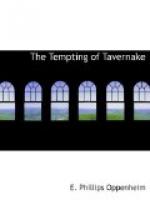Tavernake remained grimly silent. This was scarcely the time or the place which he would have selected for an explanation with his employer. There were signs, however, that the thing was to be forced upon him.
“I am very pleased indeed to meet you here, Tavernake,” Mr. Dowling went on, “pleased both for personal reasons and because it shows, if I may be allowed to say so, the interest which you take in the firm’s business, that you should devote your holiday to coming and—er—surveying the scene of our exploits, so to speak. Perhaps now that you are here you would be able to explain to Mr. Belton better than I should, just what it is that we propose.”
Tavernake hesitated for a moment. Finally, however, he proceeded to make clear a very elaborate and carefully thought out building scheme, to which both men listened with much attention. When he had finished, however, he turned round to Mr. Dowling, facing him squarely.
“You will understand, sir,” he concluded, “that a scheme such as I have pointed out could only be carried through if the whole of the property were in one person’s hands. I may say that the information to which you referred a few days ago was perfectly correct. A considerable portion of the south side of the hill has already been purchased, besides certain other plots which would interfere considerably with any comprehensive scheme of building.”
Mr. Dowling’s face fell at once; his tone was one of annoyance mingled with irritation.
“Come, come,” he declared, “this sounds very bad, Mr. Tavernake, very neglectful, very careless as to the interests of the firm. Why did we not keep our eye upon it? Why did we not forestall this other purchaser, eh? It appears to me that we have been slack, very slack indeed.”
Tavernake took a small book from his pocket.
“You will remember, sir,” he said, “that it was on the eleventh of May last year when I first spoke to you of this site.”
“Well, well,” Mr. Dowling exclaimed, sharply, “what of it?”
“You were starting out for a fortnight’s golf somewhere,” Tavernake continued, “and you promised to look into the affair when you returned. I spoke to you again but you declared that you were far too busy to go into the matter at all for the present, you didn’t care about this side of London, you considered that we had enough on hand—in fact, you threw cold water upon the idea.”
“I may not have been very enthusiastic at first,” Mr. Dowling admitted, grudgingly. “Latterly, however, I have come round to your views.”
“There have been several articles in various newspapers, and a good deal of talk,” Tavernake remarked, “which have been more effectual, I think, in bringing you round, than my advice. However, what I wish to say to you is this, sir, that when I found myself unable to interest you in this scheme, I went into it myself to some extent.”




